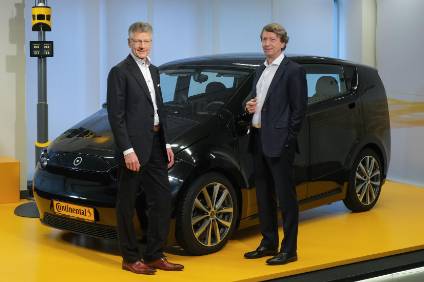
Continental has posted a strong set of financial results for 2018. The company’s sales totaled EUR44.4bn and the adjusted EBIT margin was 9.3%, which meant that the supplier giant achieved its adjusted annual targets.
“Over the past year, we have again demonstrated our excellent performance despite the weak markets. We are continuing to grow faster than our relevant industries and markets,” said Dr. Elmar Degenhart, CEO of Continental.

Discover B2B Marketing That Performs
Combine business intelligence and editorial excellence to reach engaged professionals across 36 leading media platforms.
“Autonomous driving, electric mobility and connectivity: We are the architects of an ecosystem of safe, clean and intelligent mobility. When people talk about the ‘mobility of the future,’ they mean Continental. We are supplying what others are still testing. Our solutions, components, and systems are already generating enhanced safety, efficiency and comfort in four out of five vehicles worldwide,” said Degenhart.
“Grip is one of our traditional key fields of expertise in the tyre business. It is part of our corporate culture, and we transfer it even to our connectivity technology, providing dependable solutions to offer secure contact, from the road to the cloud, all from a single source like no other company.”
Conti said its unique technology portfolio once again helped it to grow at a faster rate than its markets in 2018. Continental’s organic sales growth was 3%. “Our growth is testament to the confidence our existing and many new global customers have in our innovation capacity. In addition, our net income of €2.9 billion was almost at a record level. That is a solid result given the disappointing market development in the past year,” said Wolfgang Schäfer, Continental’s CFO.
Conti said that 2019 has got off to a ‘subdued start, as expected, due to continuing market uncertainty’. Continental is reaffirming its preliminary guidance from early January. The company still expects sales of around EUR45-47bn and an adjusted EBIT margin of approximately 8-9%. “The guidance for 2019 is based in part on the assumption that the global production volume of passenger cars and light commercial vehicles will be stable at 94 million. Production in the first half of the year is likely to be down on last year’s figure. In our eyes, risk factors include the unclear ramifications of economic development in China and the trade disputes between the U.S.A. and China and between the U.S.A. and Europe – and then there is also the unclear situation with Brexit,” Schäfer said.
In the current fiscal year, Continental said it will lay the important groundwork for the organizational realignment announced last July. A crucial part of this realignment is the potential partial IPO of the powertrain business, which, under the name “Vitesco Technologies,” will develop, sell and produce systems and solutions for conventional and electrified drives for automotive manufacturers worldwide. “We completed the transformation of our powertrain business into an independent group of legal entities in record time,” Degenhart said. The company’s preparations for a potential partial IPO in the second half of 2019 are on schedule, it said.
The order intake in the Automotive divisions, which specialize in vehicle electronics, remained at a high level. It amounted to around EUR40bn in the past fiscal year – on a par with the previous year’s record level.
Recruitment drive for software engineers
The global Continental team comprised 243,226 employees in 60 countries and markets at the end of the year. Continental has approximately 49,000 engineers working on new trends and technologies, and just under a third of those engineers have a background in software. Continental wants to increase its workforce of software and IT experts from 19,000 at present to 25,000 by the end of 2022.






